Harvard Professor and Faculty Director of the African Center for African Studies, Prof. Zoe Marks, visits Slum2School Africa in Lagos, Nigeria.
Slum2School Africa welcomes Harvard Professor, Prof. Zoe Mark and the other Leaders from the Harvard Center for African Studies.
On a bright Lagos morning, the halls of Slum2School Africa buzzed with excitement. Children in colorful shirts darted across the courtyard of the school, carrying notebooks, soccer balls, cooking pots and handmade crafts. It was another day of the ongoing summer school program but today was different, they weren’t informed that they would be met by visitors from one of the world’s greatest institutions of learning.
The guest of honor was Professor Zoe Marks, Professor at the Harvard Kennedy School and the Faculty Director of the Harvard Center for African Studies (HCAS). Known globally for her scholarship and advocacy, Professor Marks had come to see, listen, and experience the extraordinary model of education and community transformation created by Slum2School Africa. She was also accompanied by the Director of Communications at the Harvard Center for African Studies, Sirak Kurban. She was received by Orondaam Otto, the founder of Slum2School, who years earlier had sat in her classroom as a student at Harvard Kennedy School in Cambridge, United States. Now, their paths converged again, but this time on African soil, in a community where dreams take root against all odds.
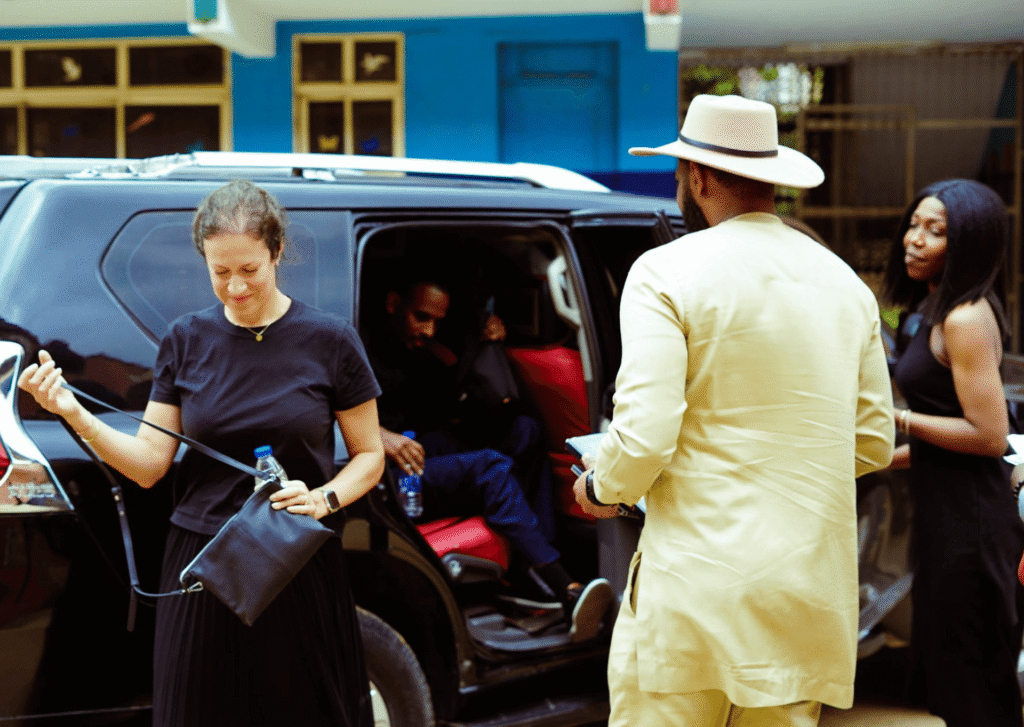

The visit unfolded with little expectations as Professor Marks began her tour. At the STEM and Innovation center, a space brimming with creativity, children demonstrated how they code basic apps, build solar-powered devices, and use robotics to solve everyday problems. Their eyes sparkled with pride as they explained their projects. As Shakirat showed how she was using cartons to build a car, another young learner said, “We want to create things that help our community”, showing off a game app he was building on the desktop.
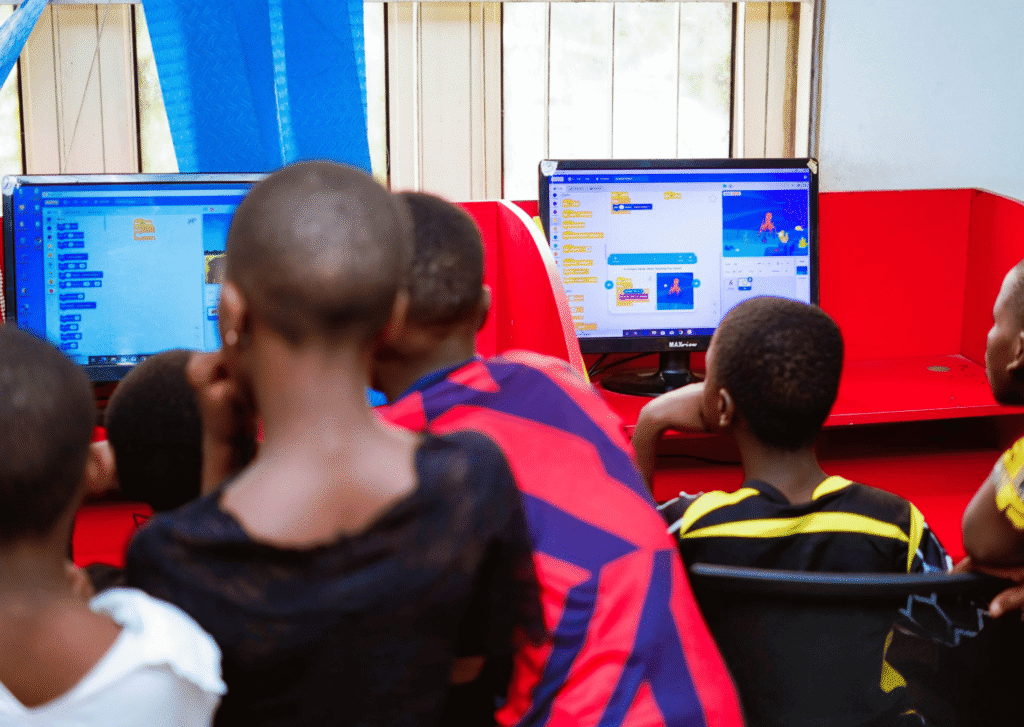
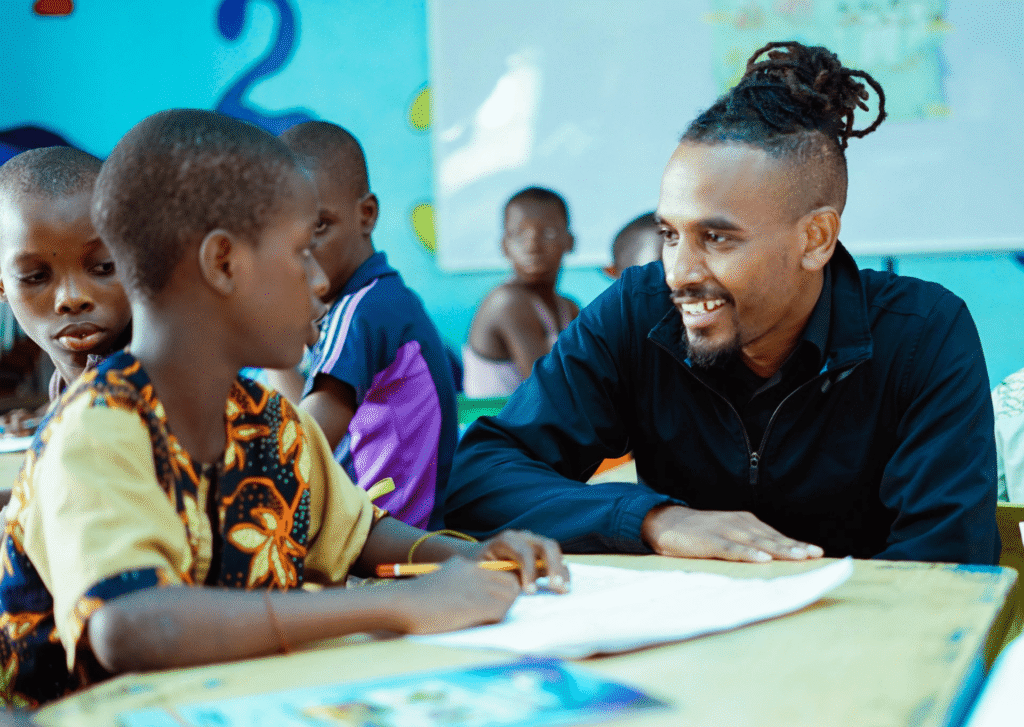
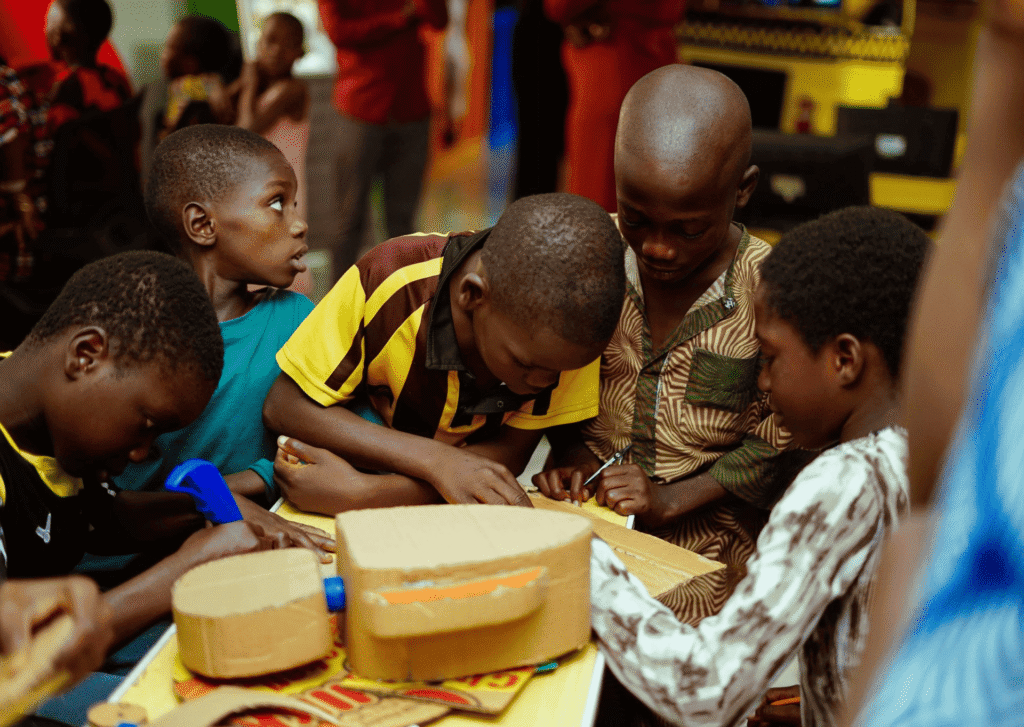
From science, the journey moved to the music and performing arts studios, where rhythmic drumming and sweet harmonies filled the air. The children choir was in practice, as they acted out scenes that told stories of resilience and hope. Each performance was not just entertainment but a declaration of identity, a reminder that art is a powerful tool for self-expression and healing.
In the home economics and catering class, the aroma of freshly baked snacks commonly called “small chops” welcomed the delegation. Children confidently shared recipes, explaining how learning to cook was more than just a skill, it was preparation for self-reliance and future livelihoods. Professor Marks was treated to a little bite as she had her first experience of the special Nigerian grilled samosa, chicken and puff puff.
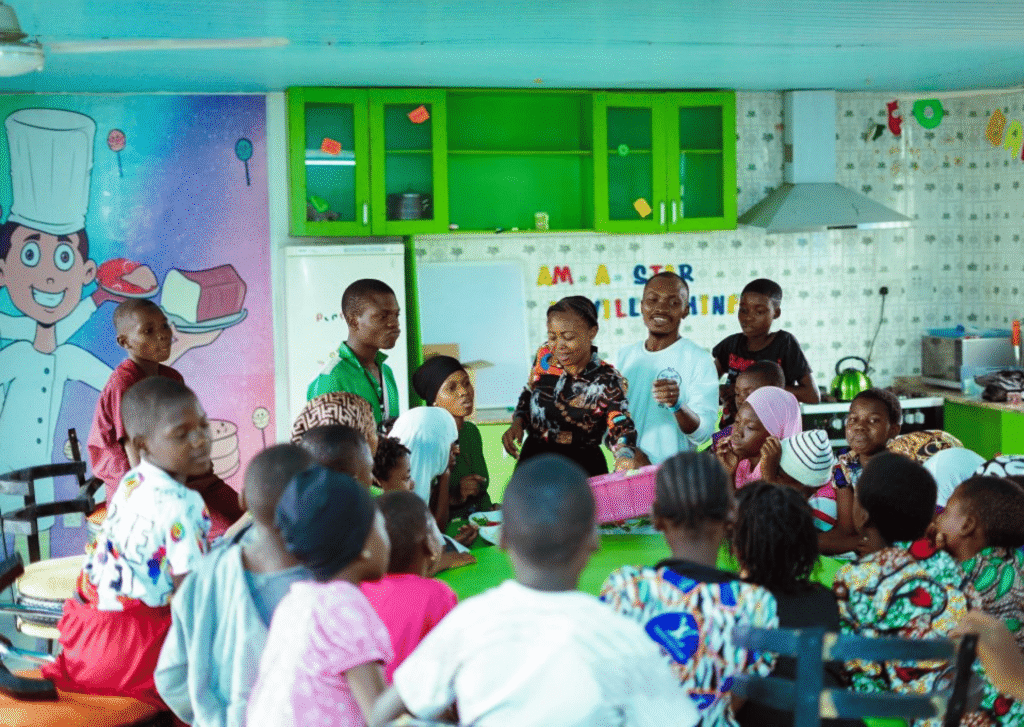
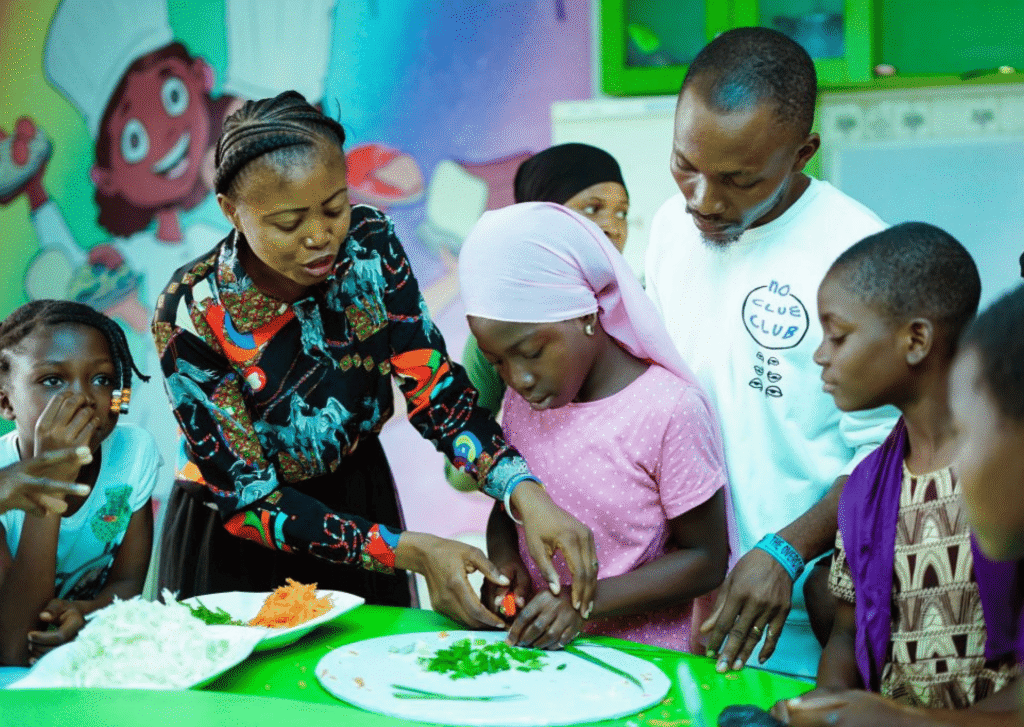
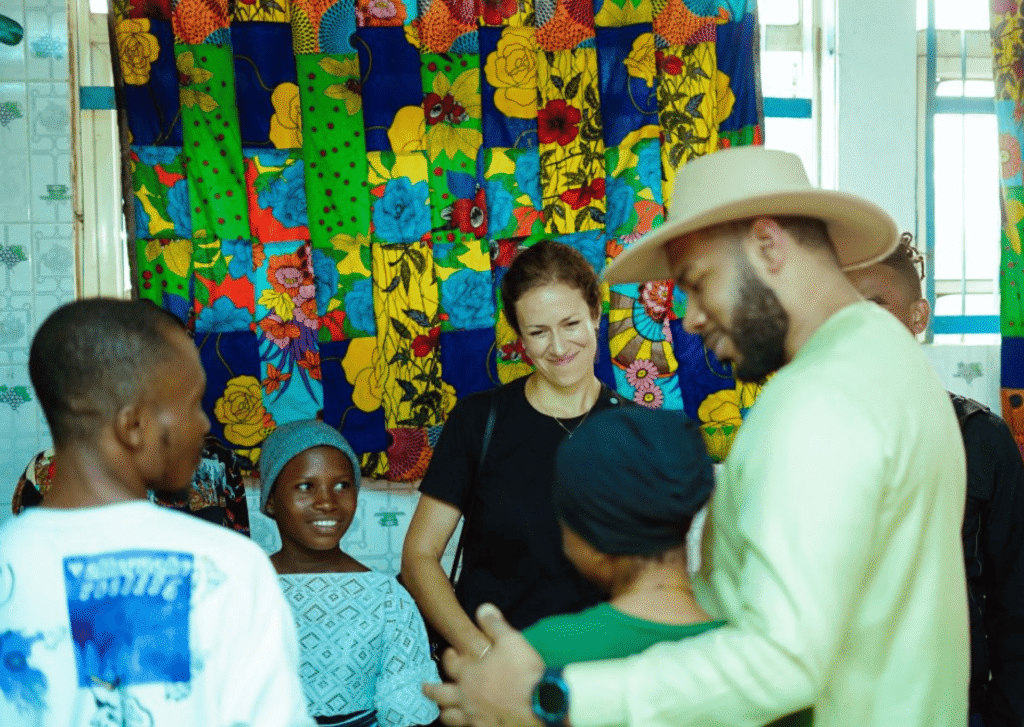
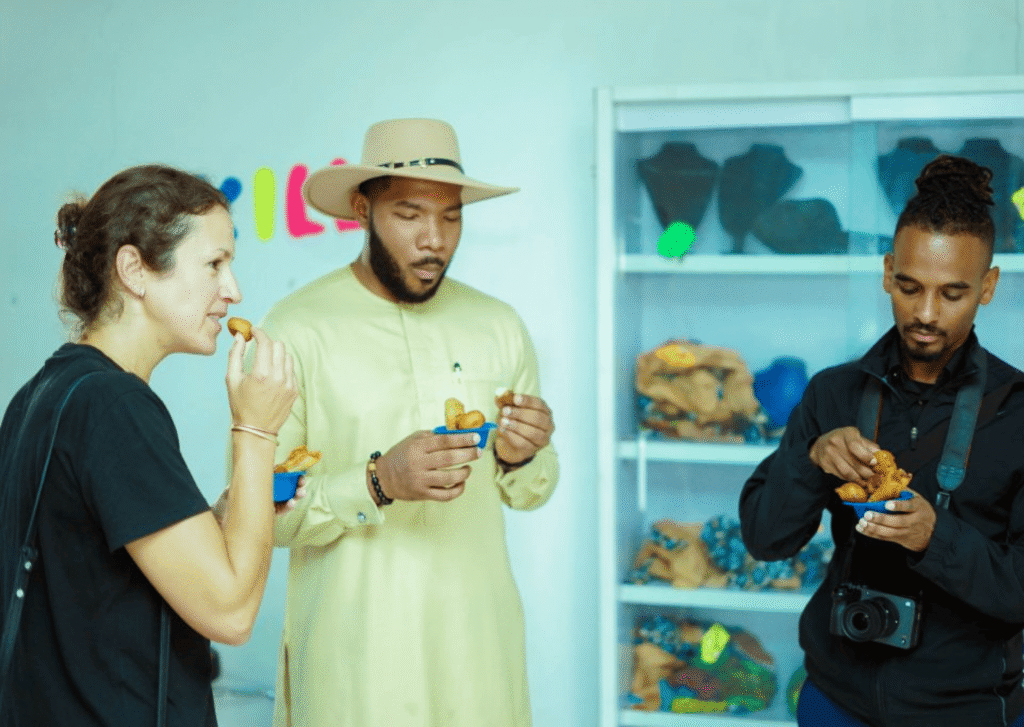
Next came the sustainability and recycling workshops, where waste materials were reborn as flowerpots, art pieces, and functional items. Professor Marks marveled at how resourcefulness was being taught not as a theory but as a lifestyle.
The creative arts and crafts sessions revealed even more. Little hands stitched, painted, and built models that spoke volumes of imagination. Just a few steps away, in the literacy and public speaking workshops, young scholars stood before their peers, reciting poems, delivering speeches, and debating issues with striking clarity.
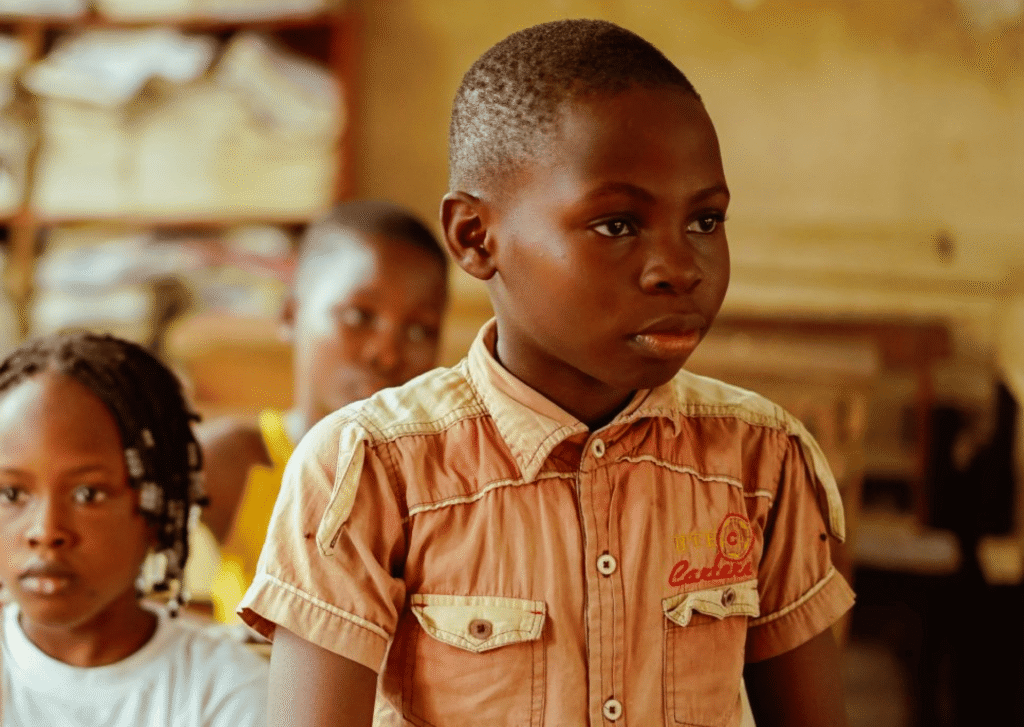
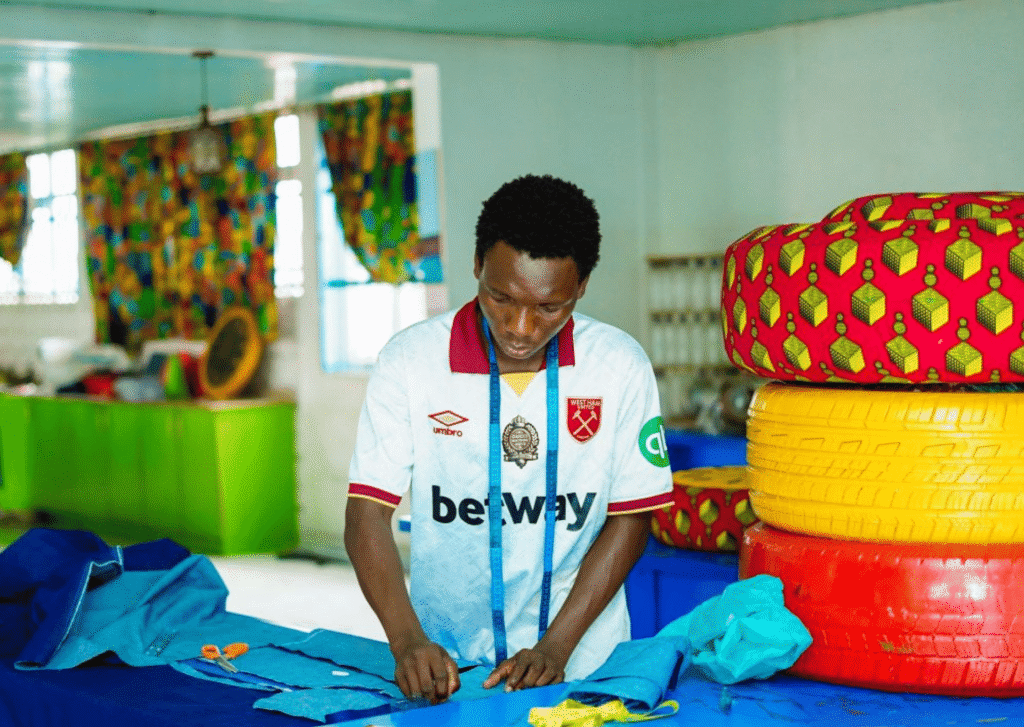
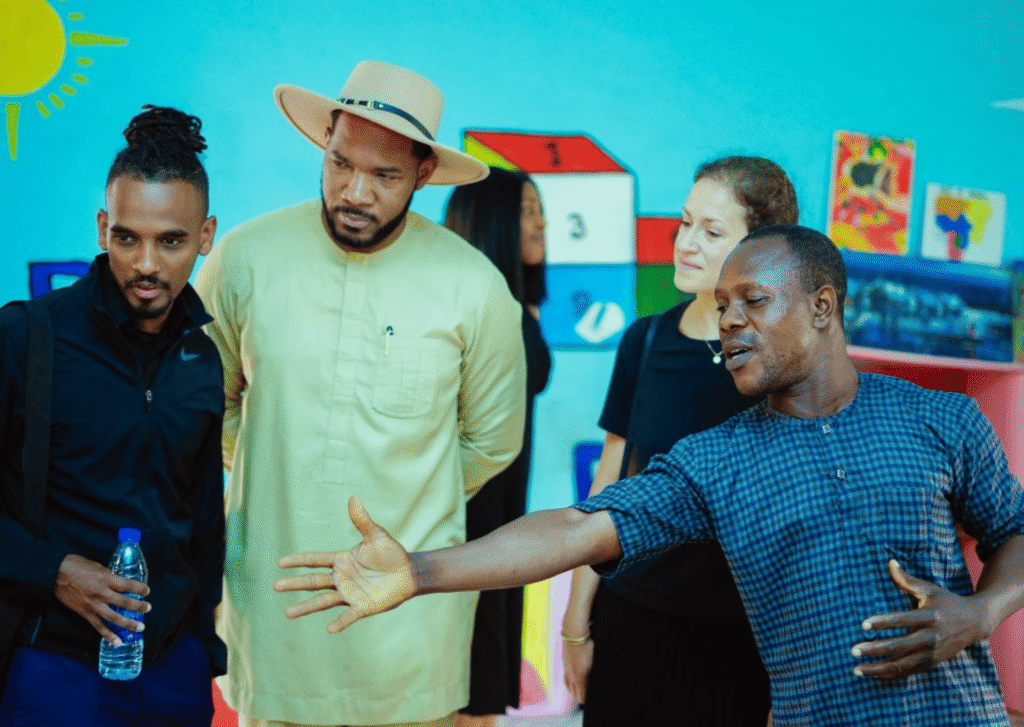
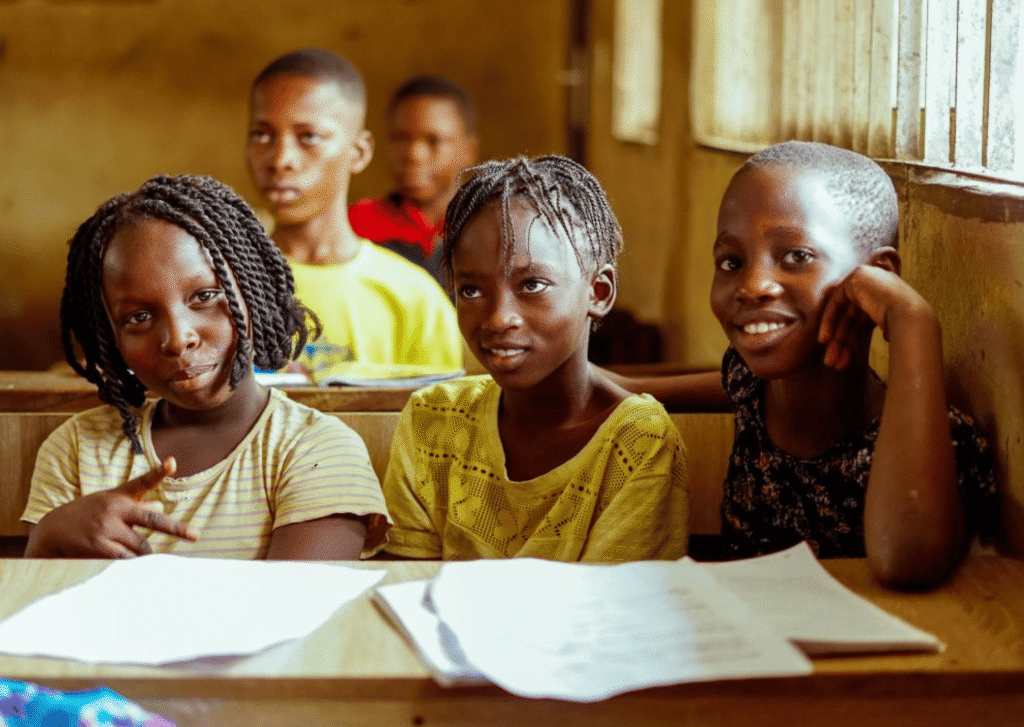
One experience that left the team marvelled was how Ayomide was able to recite a 300-word poem he just learnt less than two hours ago.
Their voices carried not just confidence but vision, the audacity to believe they belonged and someday they would sit in boardrooms, parliaments, and global stages.
Finally, laughter and cheers led the delegation to the sports arena, where children sprinted across the field, played soccer with joy, and showcased athletics as more than play, it was teamwork, discipline, and health in motion.
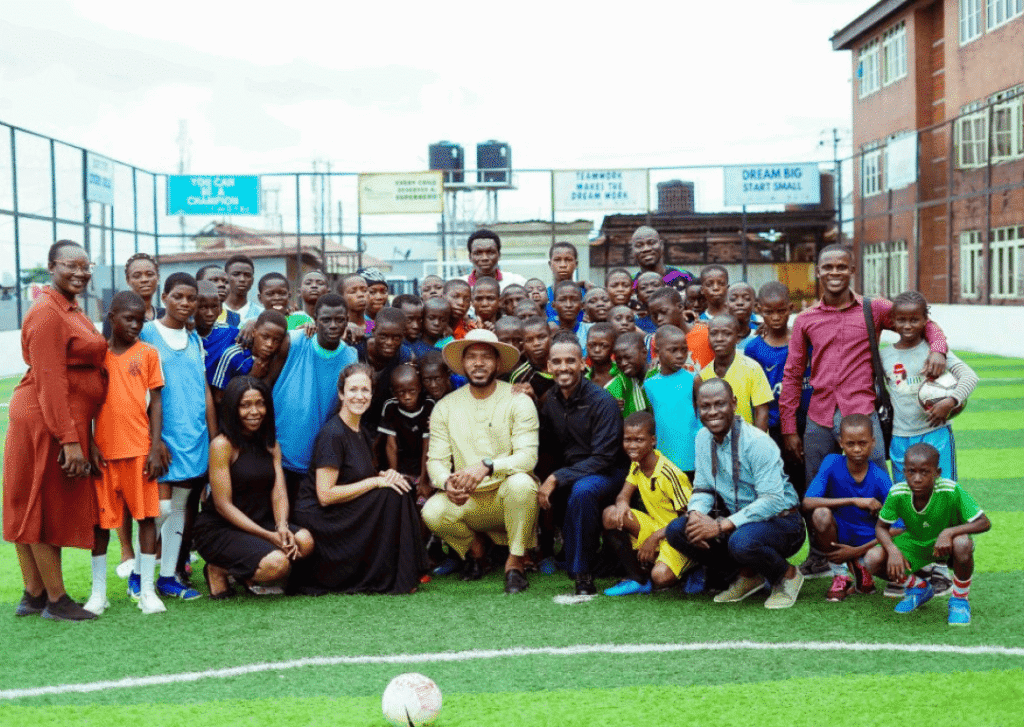
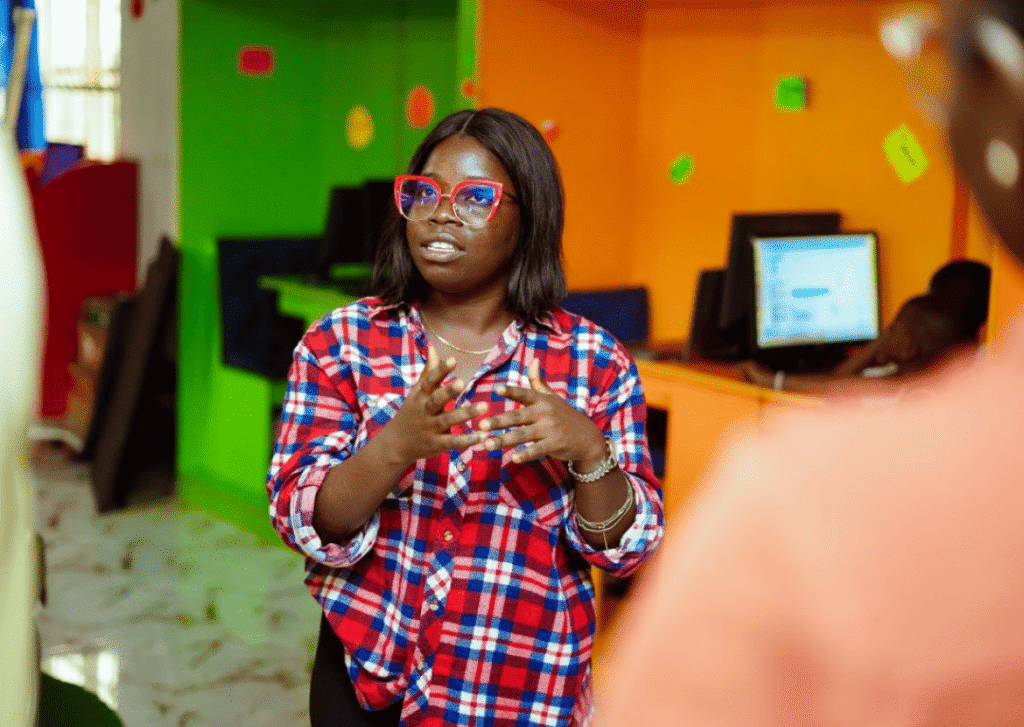
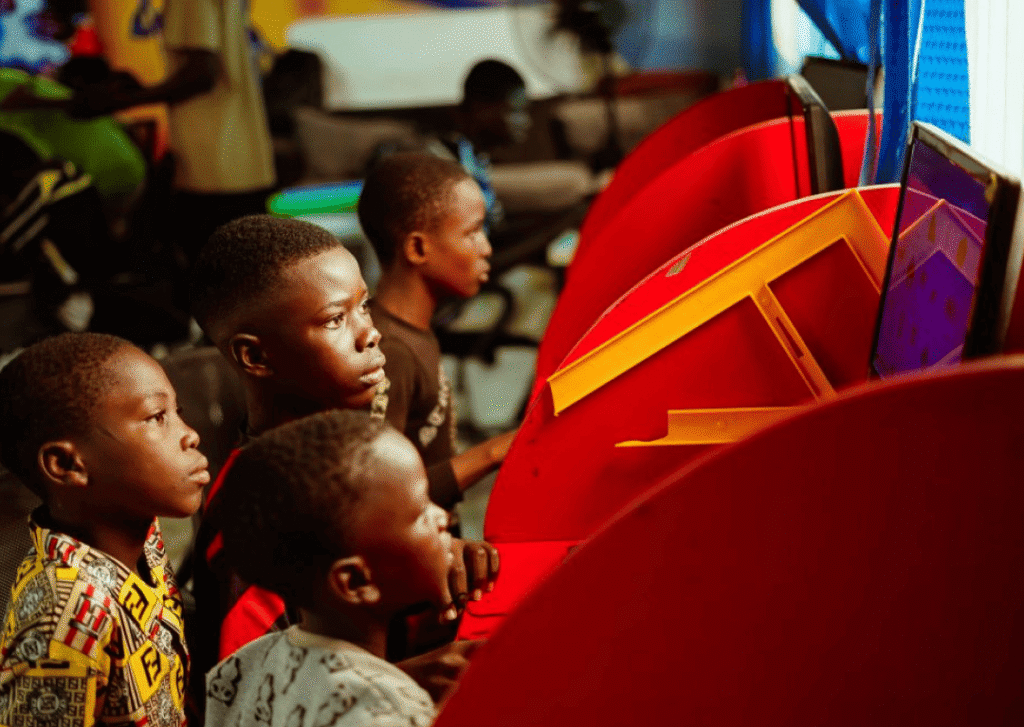
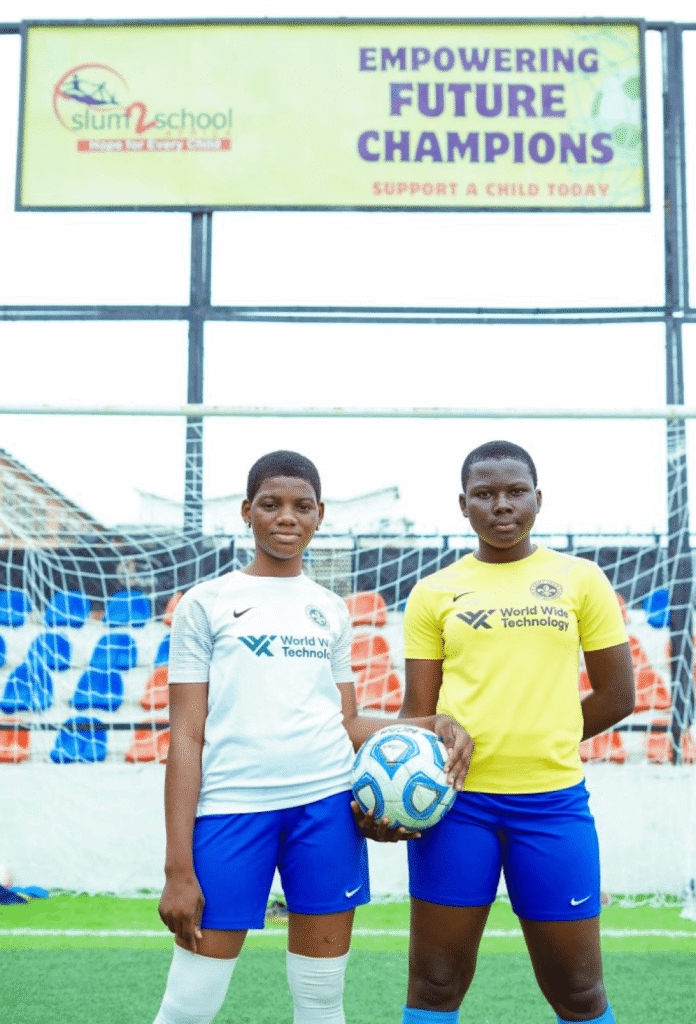
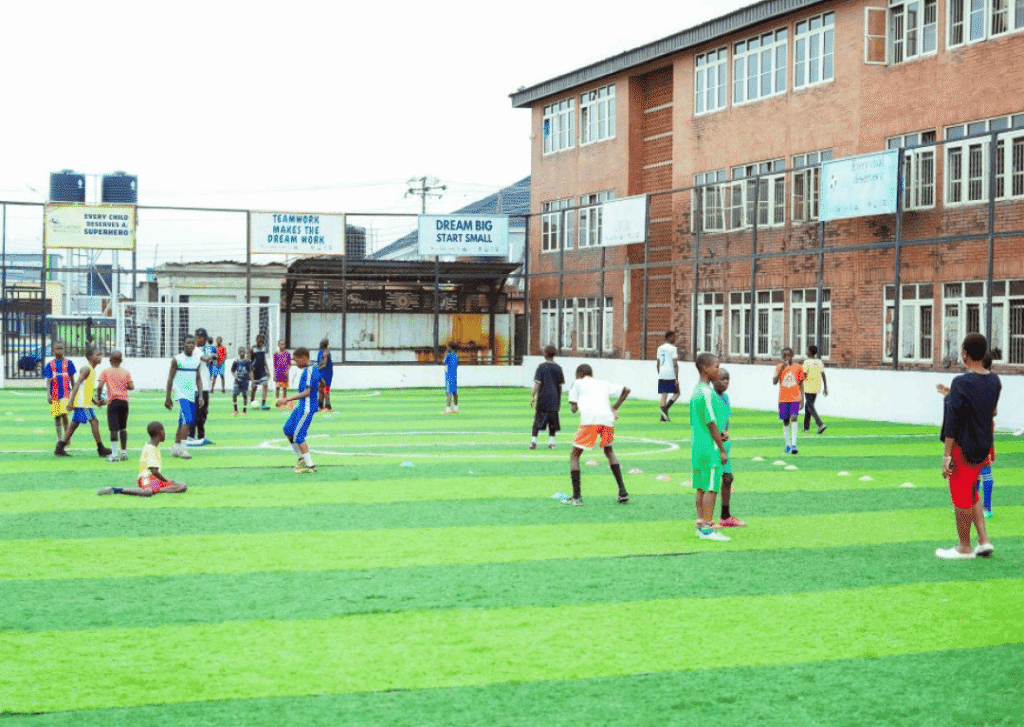
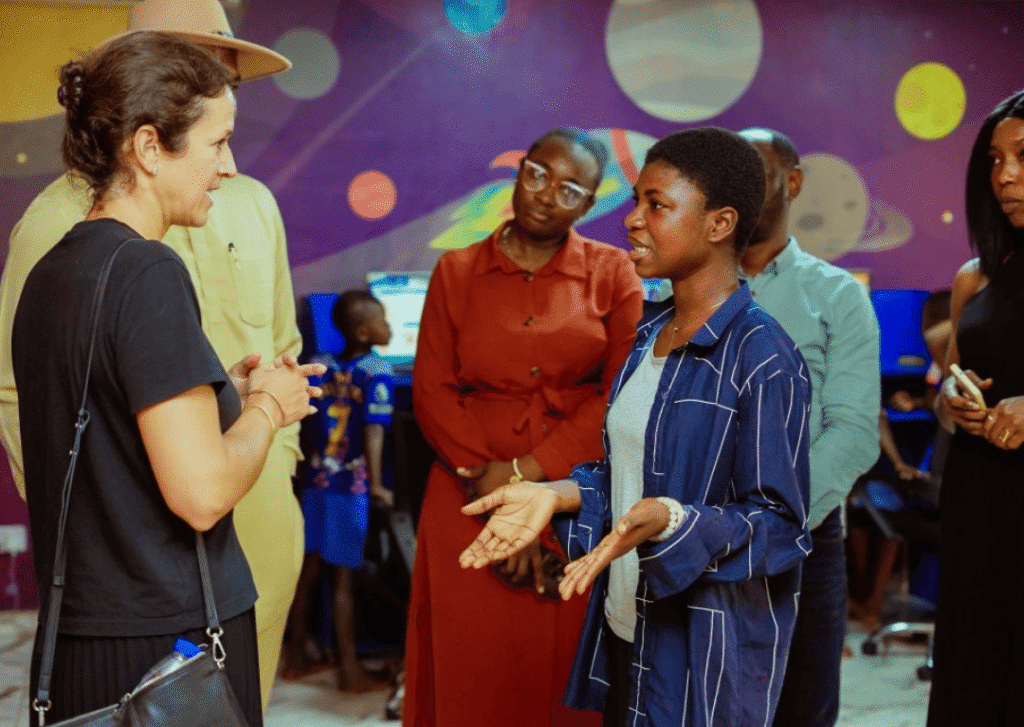
At every stop, Professor Marks and Sirak Kurban bent down to speak with the learners, asked them questions, and encouraged them to keep dreaming. Her presence was not distant or formal; it was warm, human, and deeply engaged.
Alongside her, the Slum2School management team, including Adekunle Idowu, Oluyemi Alugo, Lois Ifeanyichukwu, and many passionate teachers, and community volunteers stood proudly, showcasing what years of dedication and innovation had built.
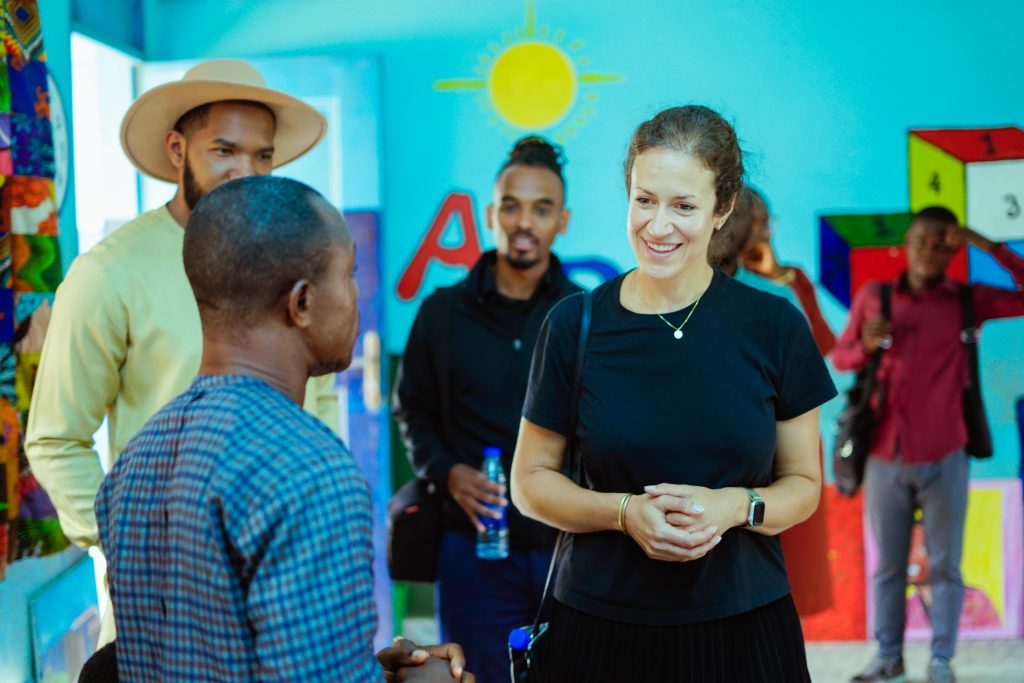
Her visit didn’t end at the school. She decided to continue her journey with Slum2School at the organization’s Innovation Hub in Lekki, a vibrant and centralized ecosystem designed to nurture creativity, innovation, and dignity for children who occasionally visit the hub from various other communities like Epe, Bariga, Badagry, Makoko etc.
Her first stop was the Virtual Learning Studio, Africa’s pioneering ed-tech platform that connects children in underserved communities with high-quality teachers and learning resources. The technology which was built during the Covid-19 pandemic reminded her of the potential in adversity. Watching the videos where learners interact with lessons beamed across borders, she reflected on how technology was breaking barriers and creating possibilities for children who might otherwise be left behind. “This is innovation with impact,” she noted, visibly inspired by the ingenuity she witnessed.
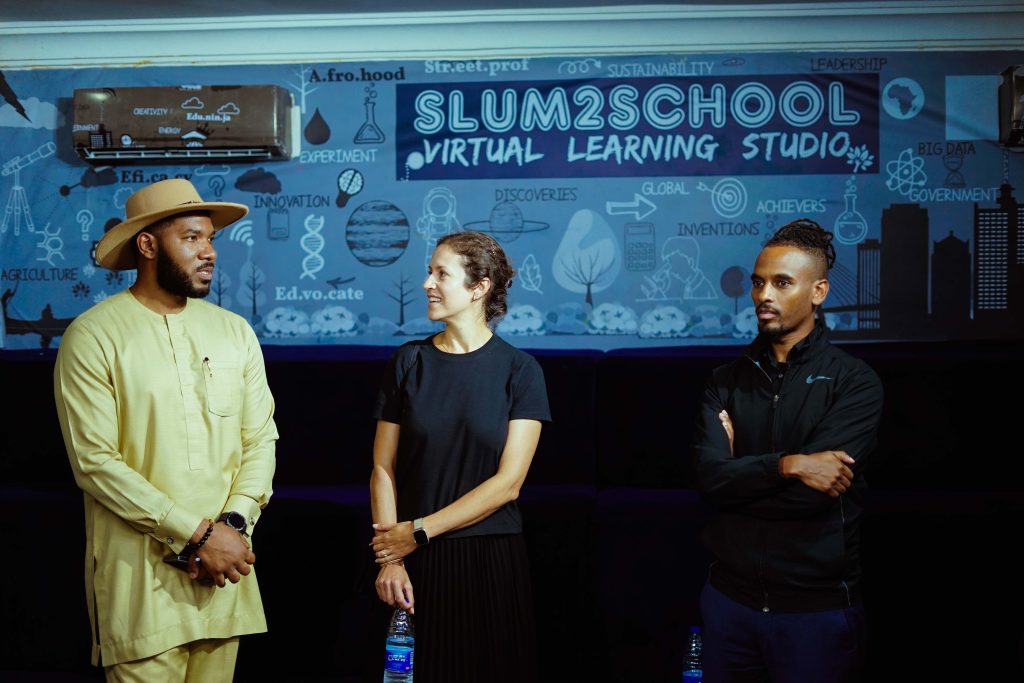
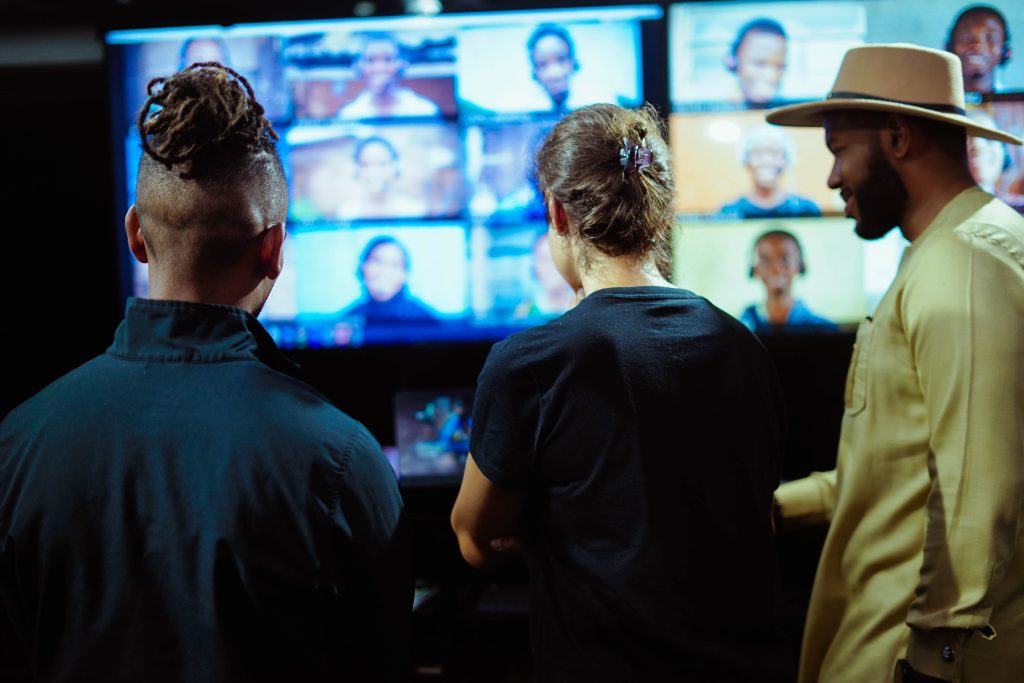
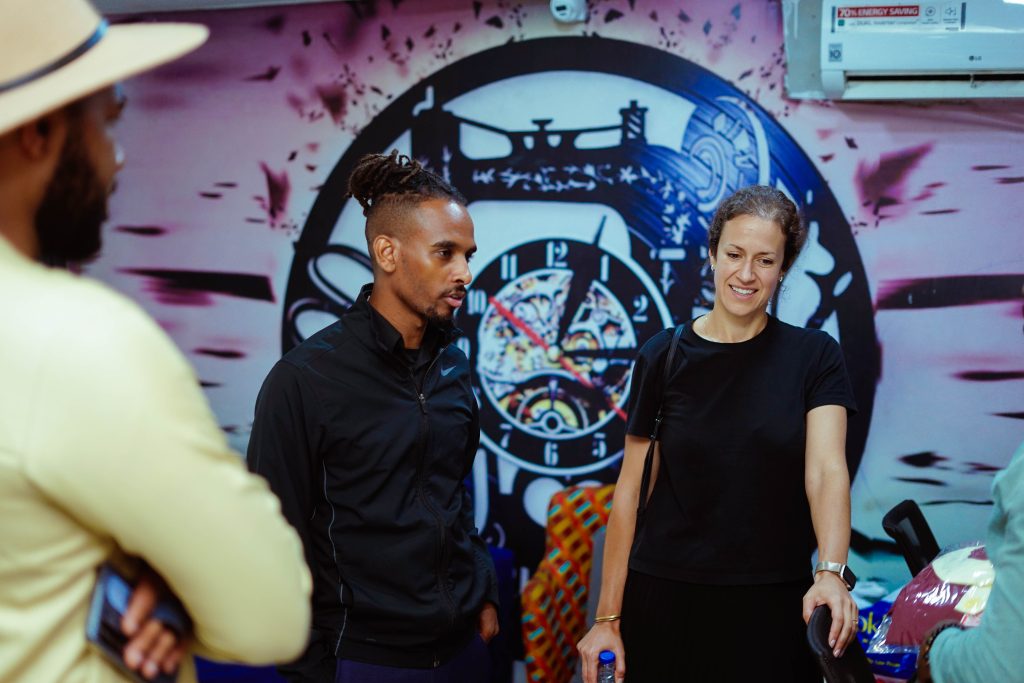
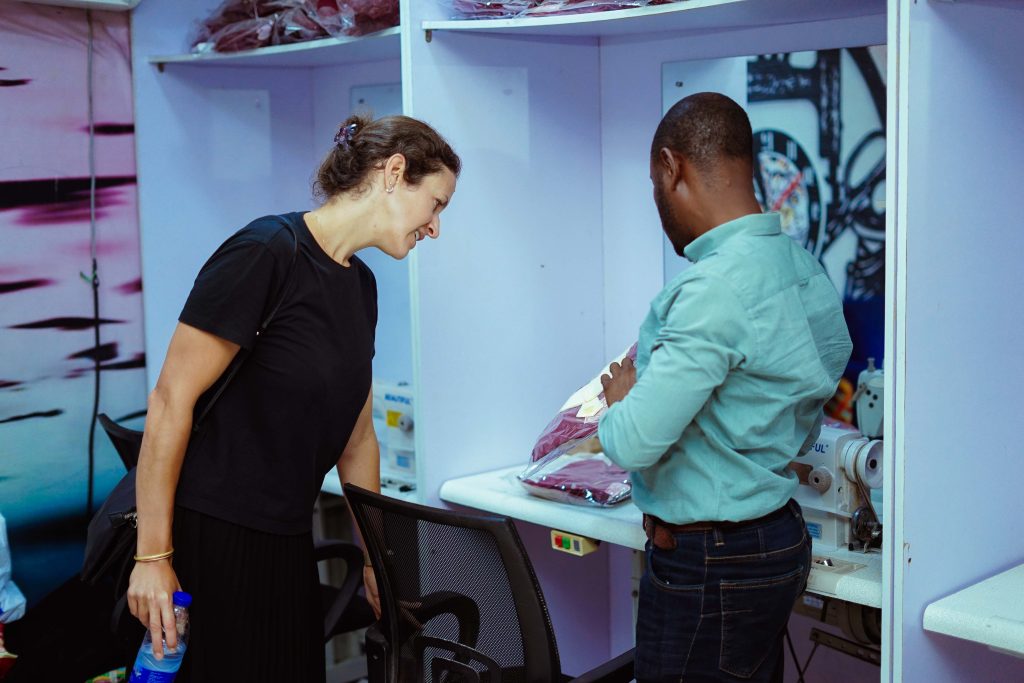
Professor Marks also spent time with staff members and volunteers who fuel the organization’s vision, and sat with Otto in his office to listen to his dreams of the ideal Africa. Their passion and commitment, she said, was a reminder that Africa’s transformation lies in the hands of young people who refuse to give up on their communities. In her interactions, she shared opportunities for sustainable collaboration between Harvard and Slum2School Africa, from sending Harvard students for internships here at Slum2School in Lagos, to creating volunteer exchanges, to integrating the Slum2School story as a global case study on innovative education and equity.
Still, her heart sought to understand the children’s lives beyond classrooms and hubs. The next day, she visited Makoko community, the waterfront community where many Slum2School learners live. Crossing wooden bridges and navigating narrow alleys perched above the lagoon, she came face-to-face with the realities of poverty. Yet, amid the challenging environment, she was struck not by despair but by the resilience, warmth, and determination of the families she met.
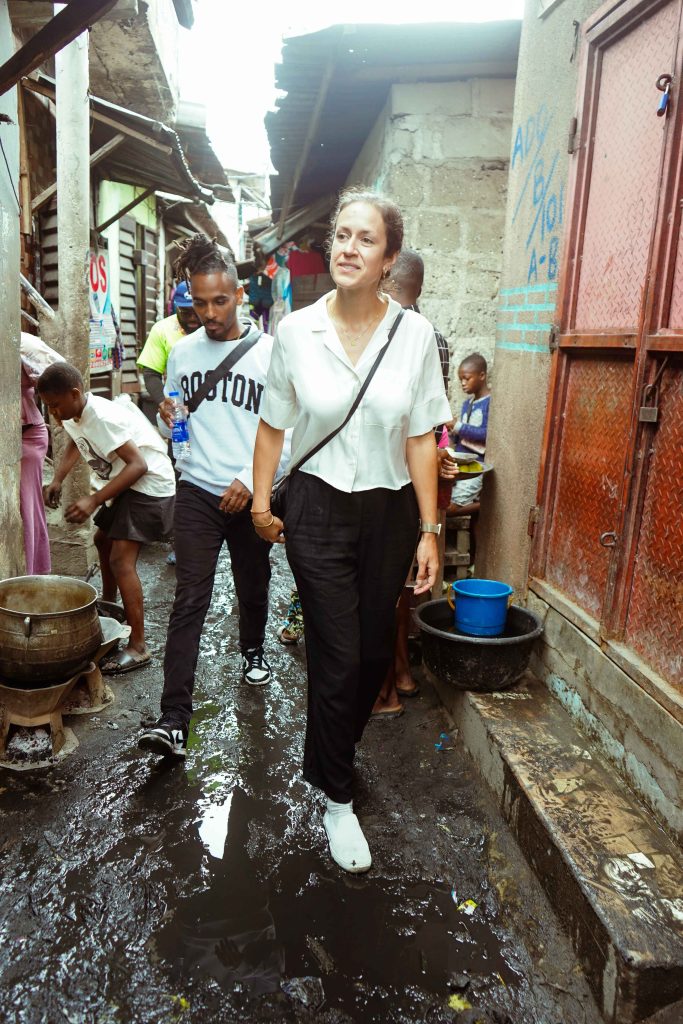
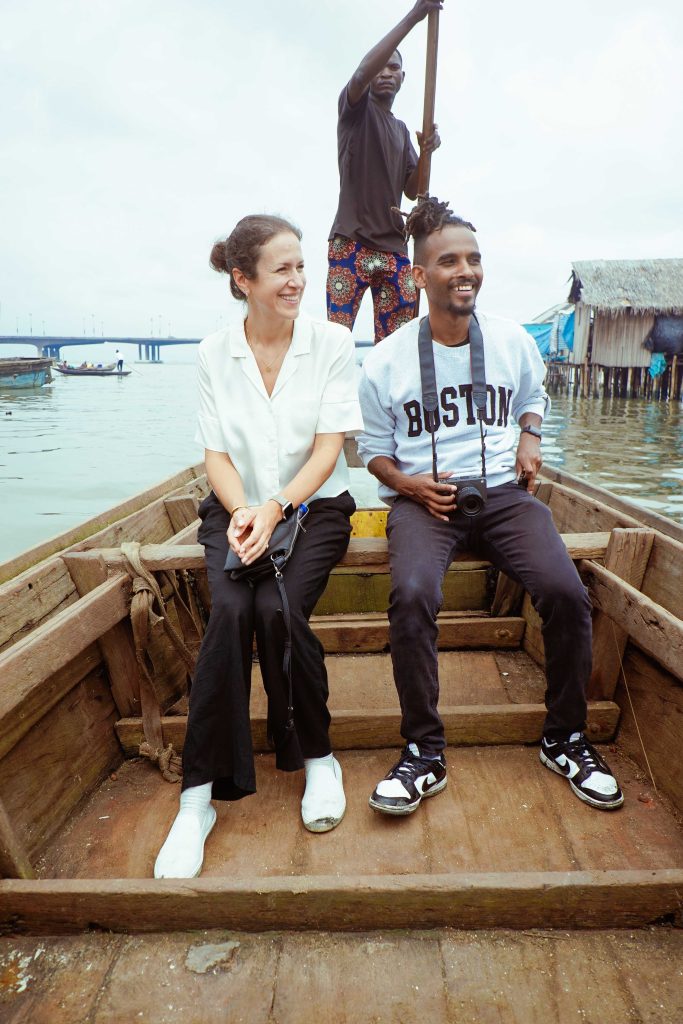
One encounter stood out profoundly: Mariam Alade, a 19-year-old Slum2School scholar and second-year student at the African Leadership Academy in South Africa. Mariam shared her journey of perseverance, her aspirations, and her dream of attending Harvard University. Deeply moved, Professor Marks promised to write her a recommendation letter, an act that symbolized both belief in Mariam’s future and faith in the potential of countless other children in her community.
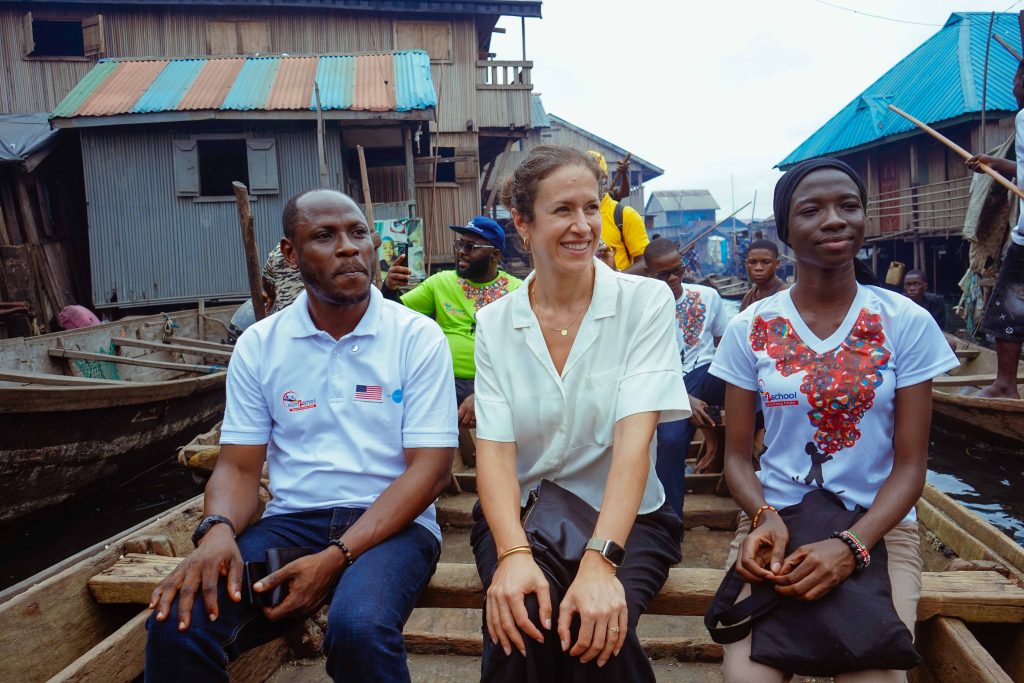
Reflecting on her visit, she described it as “a testament to the transformative power of education and leadership when rooted in community, creativity, and care.” She emphasized that the brilliance she witnessed was not an exception, but evidence of what becomes possible when children are given access and opportunity.
For Orondaam Otto, hosting his former professor at the heart of his life’s work was profoundly symbolic. “This moment shows the potential of Africa and the opportunities that must be harnessed. As a professor teaching about Africa at Harvard, it is powerful for her to feel the pulse of the continent and witness firsthand the possibilities that lie here when investment and agency are given for Africa to take the lead in her own development,” he said.


For the children, the visit was unforgettable. Meeting a Harvard professor was not just inspiration, it was a reminder that their dreams are real, their voices matter, and their classrooms in Lagos connect to the wider world. As the sun set on days filled with music, science, and laughter, one truth remained clear: the future of Nigeria and Africa is bright, because its children are not just learning to survive, but to lead, innovate, and reimagine the world.
The visit reached its symbolic close on August 15, 2025, with a farewell dinner co-hosted by the Harvard Kennedy School Alumni Association of Nigeria and Slum2School Africa at the organization’s Innovation Hub in Lekki. It was an evening that blended culture, reflection, and renewed commitments to advance education and collaboration across Africa.
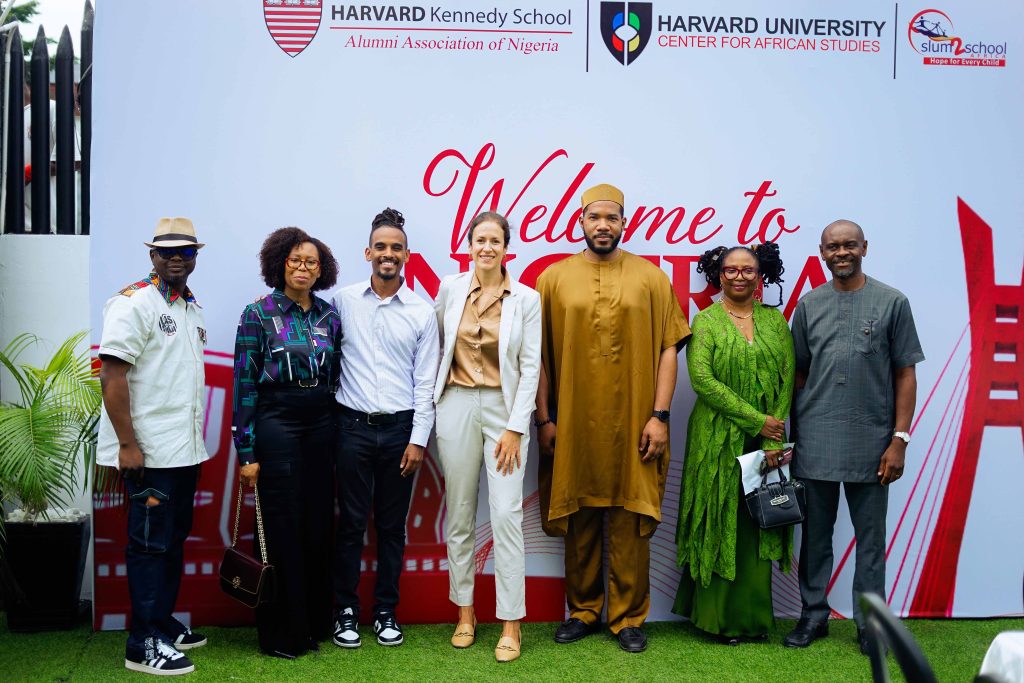
The dinner gathered a distinguished audience: Harvard alumni from the Kennedy School (HKS), Law School (HLS), and Business School (HBS), alongside the Harvard Center for African Studies (HCAS) delegation and scholars from the University of Lagos African Centre, led by Deputy Vice Chancellor, Prof. Muyiwa Falaiye. Also in attendance were Slum2School scholars, staff, volunteers, and friends of Harvard University, making it a true meeting of communities.
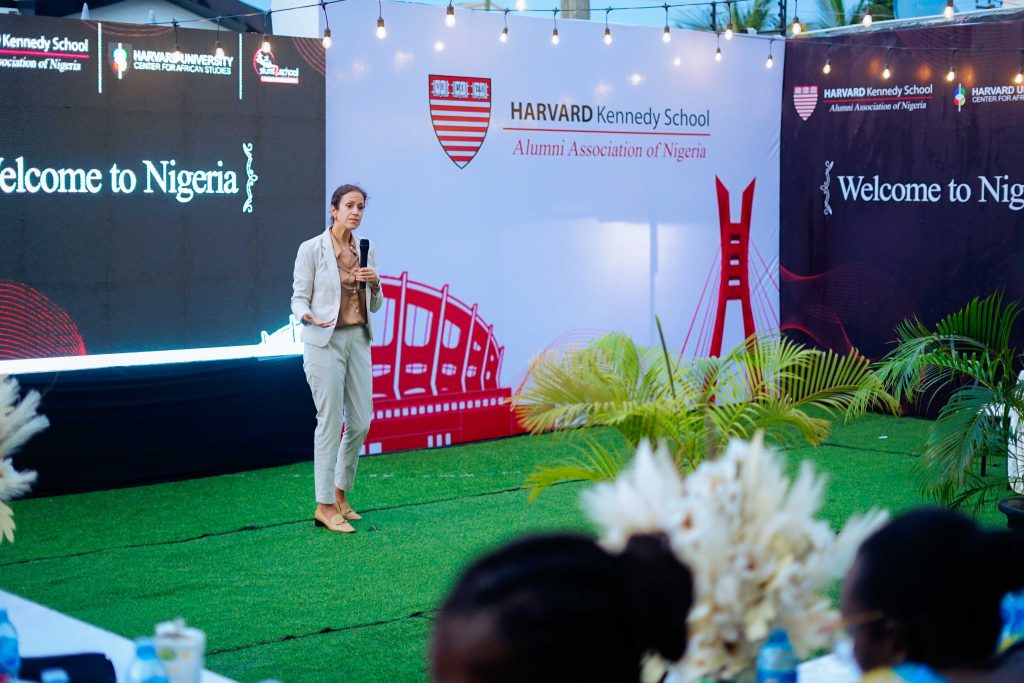
The evening opened with inspiring cultural showcases in multiple Nigerian and African languages, followed by performances from Slum2School scholars such as Jennifer Williams, Promise Okeke, Balikis, and Motunrayo Idowu. The hosts, 19-year-old Divine Ibrahim and 20-year-old Charles Usa, both Slum2School scholars, set a celebratory tone that embodied the spirit of possibility.



Remarks from the delegation including Professor Zoe Marks, Nthatisi Quella, Rosalyn Salifu, and Sirak Kurban highlighted the importance of cross-continental partnerships and alumni engagement. Alumni and board members voices like Paul Orajiaka (HKS ’17), Kunmi Adio-Moses, Tayo Olosunde, and Dr. Aderomola Adeola reaffirmed the value of collaboration and the role of African leadership in global academic networks.
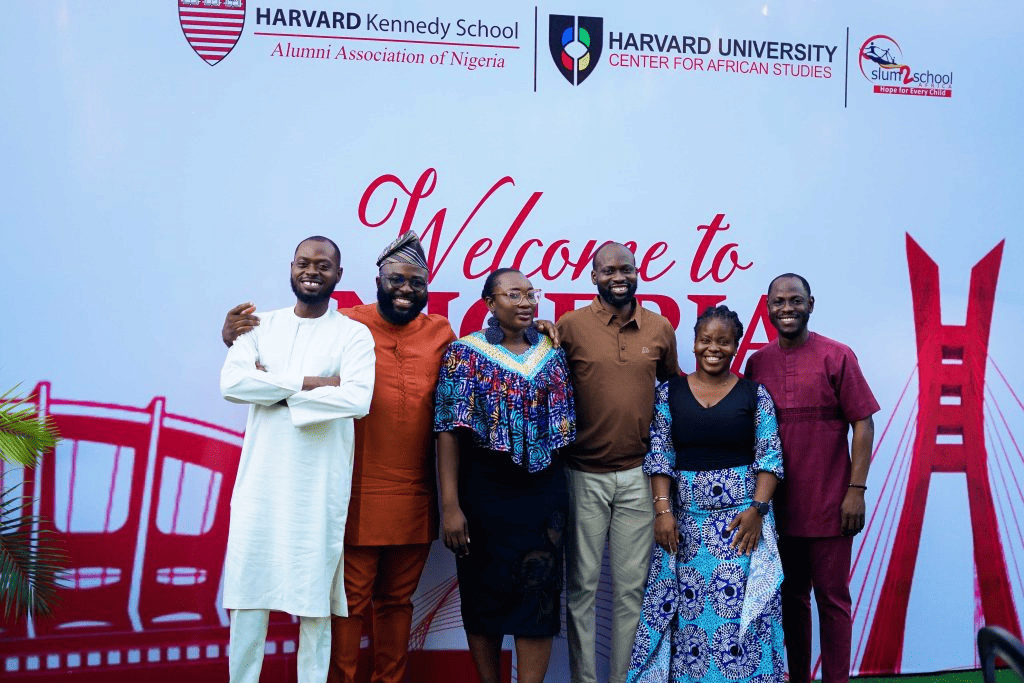
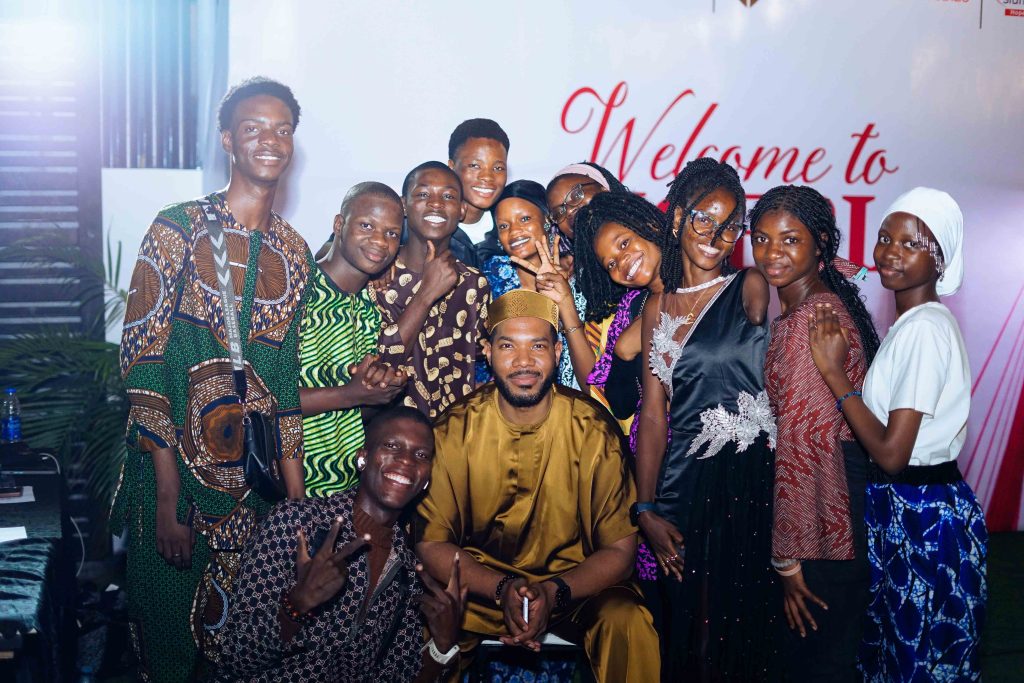
Closing the evening, Orondaam Otto reflected on the enduring contributions of Harvard alumni in Nigeria, naming leaders such as Gov. Yemi Cardoso, Olu Verheijen, Adaora Ugwu-Ndukwu, and Uche Pedro. He expressed gratitude to the HCAS team, the University of Lagos delegation, and the HKS Alumni Association of Nigeria for co-creating such a memorable event.
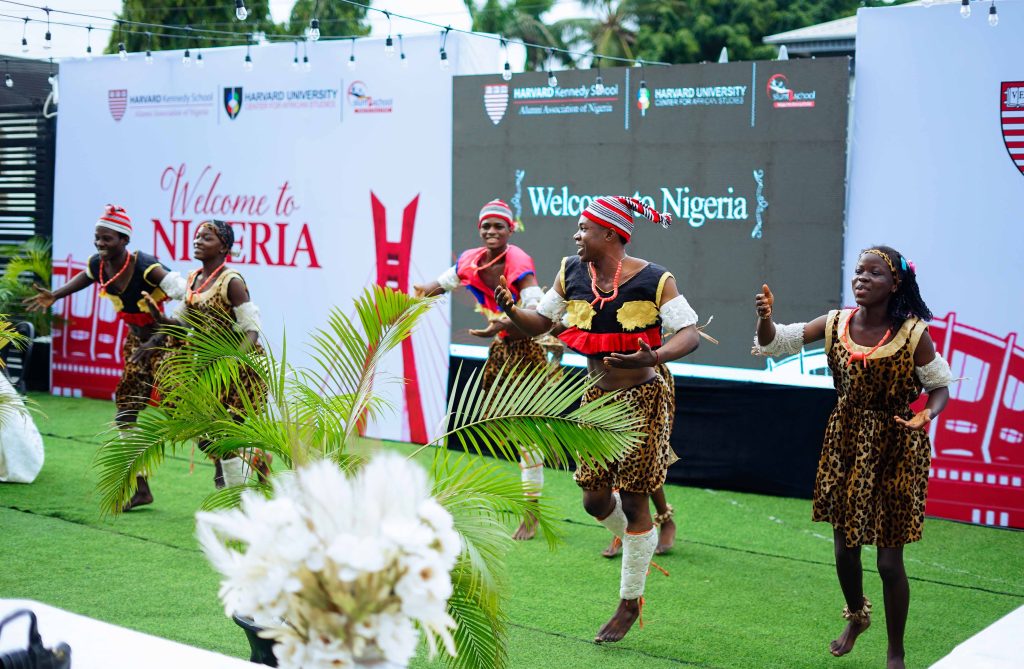
The dinner ended with gift exchanges and group photographs, a celebration not of parting, but of a bridge built between Harvard and Africa that will only grow stronger.









